Dive Training Blogs
Deptherapy returns to its Roots – Part 2
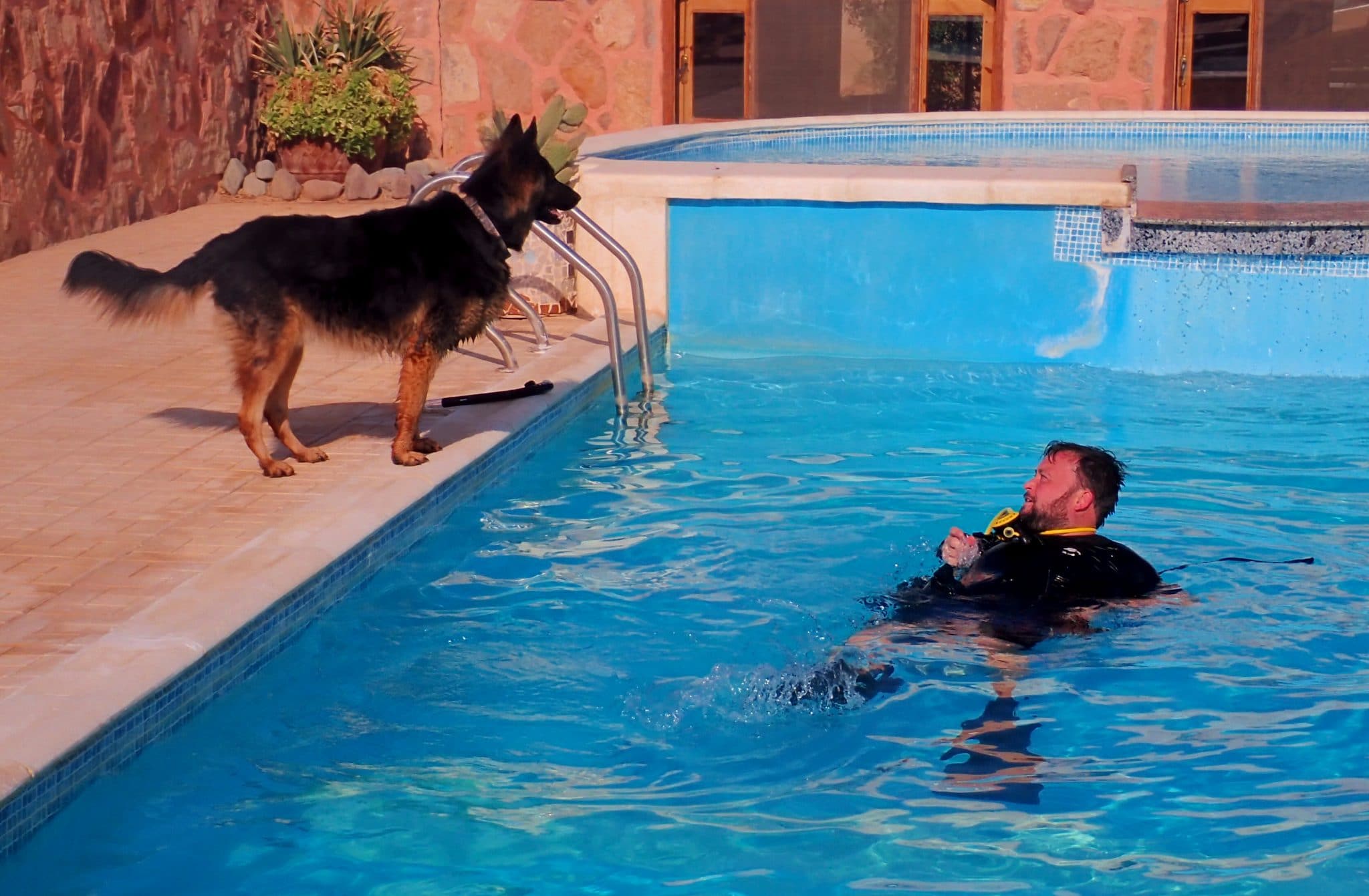
Join Richard Cullen from Deptherapy as we publish part 2 in his Blog about the charity’s recent expedition to Roots Red Sea, El Quseir, Egypt.
So here we are at Roots Red Sea, El Quseir, Egypt, and it is our first day of diving.
We have two students – Corey who is new to Deptherapy, and Keiron who is undertaking his RAID Master Rescue Course and has progressed from learning to dive with us. We also have three trainee divemasters: Tom Oates ‘Oatsie’, Tom Swarbrick ‘Swars’, and Michael. Each has progressed from OW diver with the charity.
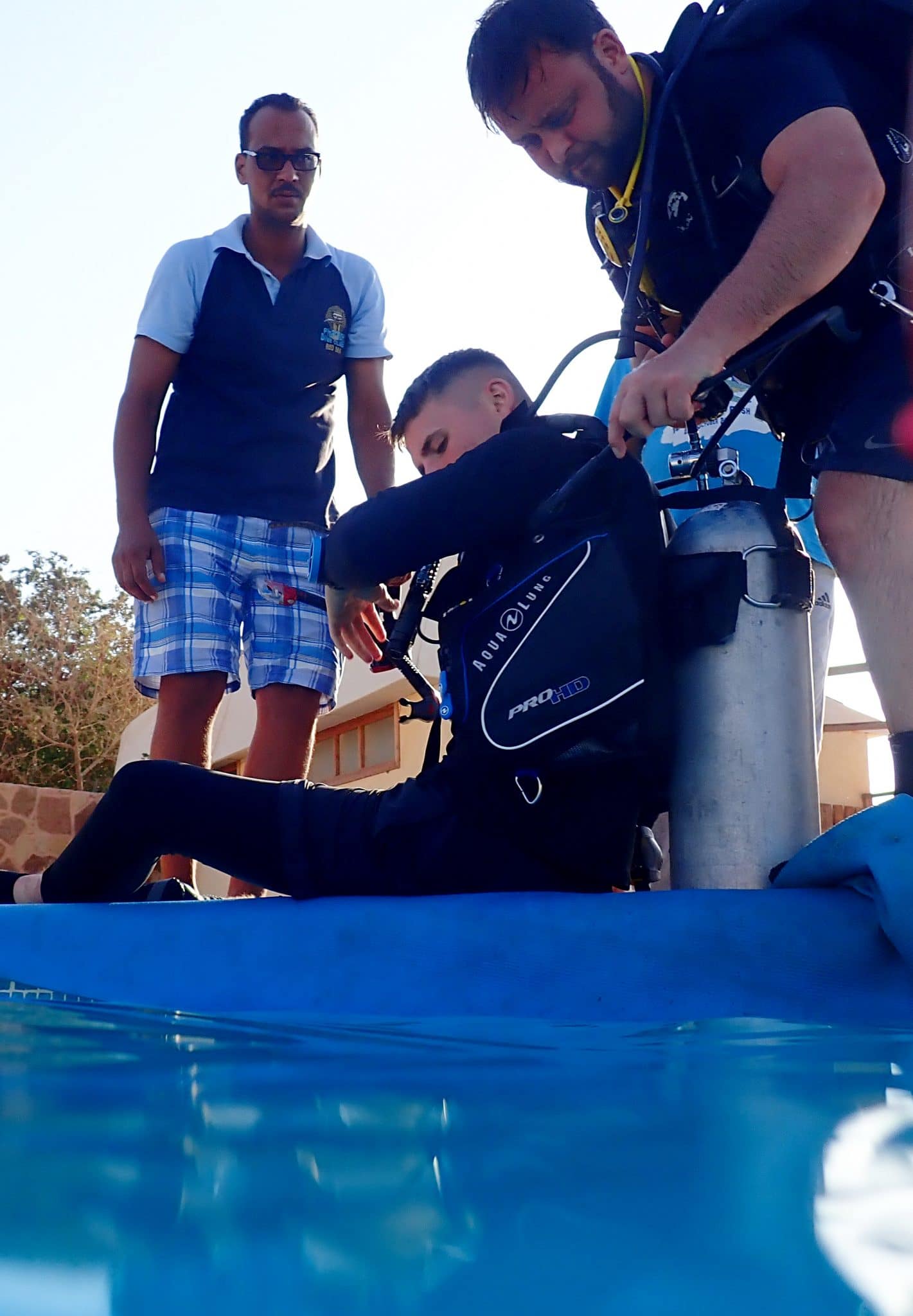
Michael prepares Corey for a deep water entry into the Roots pool
As all our programme members are open about their mental and or physical challenges these are the challenges they face:
Corey is 20 years old and was involved in a horrendous car accident while he was training to be a soldier with the Royal Anglian Regiment. The accident resulted in his spine being broken at T1 and T4. He is now paraplegic, unable to walk and he has no sensation in his legs.
Keiron was in the Scots’ Guards and served two tours in Afghanistan. He has Chronic PTSD.
Oatsie was in the Scots Guards and served one tour in Afghanistan. He has Chronic Complex PTSD.
Swars was in the Royal Anglian Regiment and he served two tours of Afghanistan. He has survivor guilt and Chronic PTSD from his first tour, and on his second tour he was shot by a sniper, losing five pints of blood and his life was saved by the excellence of battlefield medics. That tour compounded his PTSD.
Oatsie and Swars are both Deptherapy Ambassadors.
Michael was in the Royal Engineers and he has Multiple Sclerosis (MS) and Chronic PTSD. Michael is a Trustee of the charity and looks after Programme Member Liaison.
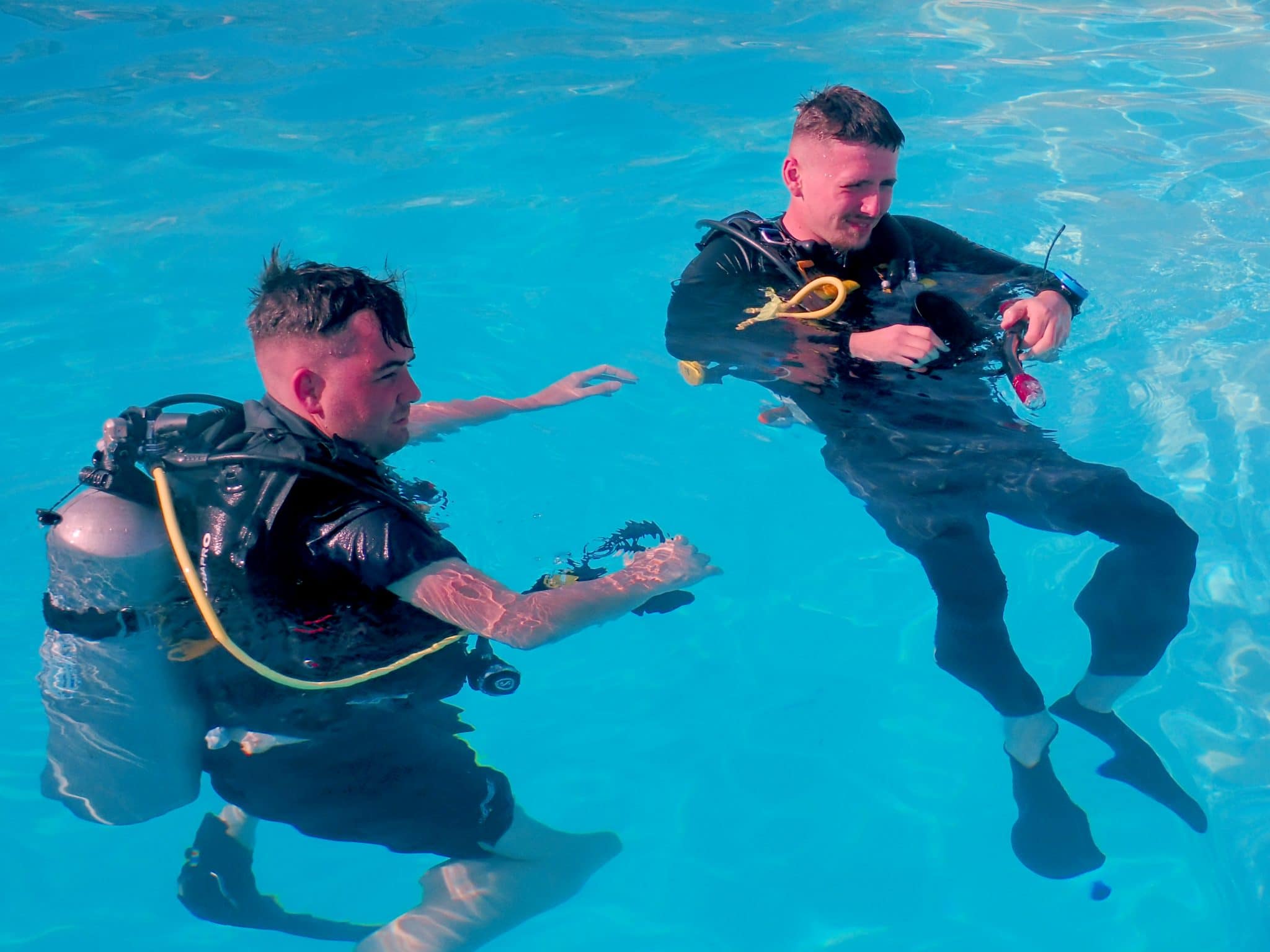
Corey and trainee divemaster Tom Oates in the pool
Every Deptherapy beneficiary has to undertake a ‘fit to dive’ medical with an HSE Approved Medical Examiner of Divers (AMED) or a Doctor who is a ‘Dive Referee’. A GP ‘sign off’ is not acceptable to Deptherapy as some conditions and medications are contraindicated to scuba diving.
After sorting out kit the whole team were required to undertake a Scuba Review as, with the exception of Michael and myself, none had been diving since last year.
Adaptive teaching requires a special mindset from instructors and divemasters. There are no experts in adaptive teaching, although some profess such expertise. Some, like myself, are very experienced in working with those who have a range of life-changing mental and or physical challenges, but we do not have all the answers. There are no “I know the answers” in adaptive teaching, every student is different, every student is an individual.
The huge danger is that ‘experts’ say I have already taught a paraplegic so teaching this paraplegic is the same; it is not!
The physical or psychological manifestation of the injury or illness is a mechanical issue, the skill is to see past the challenges and see the person you are working with – the real person.
Many have been living with their conditions for many years and have adapted to overcome the challenges that their injury or condition presents them with.
An example: Can you tie a neck tie using one hand? I bet not! I know two Deptherapy programme members who can do that and tie their shoelaces in the same way.
Your job, as an Instructor, is to allow the student to achieve the standards necessary for them to be certified as a diver. In Deptherapy we work to full mainstream certification; for us, the base is RAID Open Water Diver. We do not use the RAID Restricted Certifications of D1, D2, D3.
Veterans have a can-do mindset and very much want full certification and not a certification card that has the word ‘disabled’ on it. Do not look at what our beneficiaries achieve and think then that every person who wants to learn to dive and has a physical or mental challenge will apply themselves with such vigour. Veterans are used to ‘drills’ so skills are easy for them to learn and to master.
It’s important not be afraid to ask the student “This is what you have to do to achieve the required standard for a skill and ask how they might perform that skill.”
So, we prepared for the pool! Keiron is a known quantity for us, he is a good diver who had completed all his RAID on-line learning, quizzes and the final exam. Corey was new to us having qualified as a PADI Open Water diver on a trip to the Florida Keys with another charity last year.
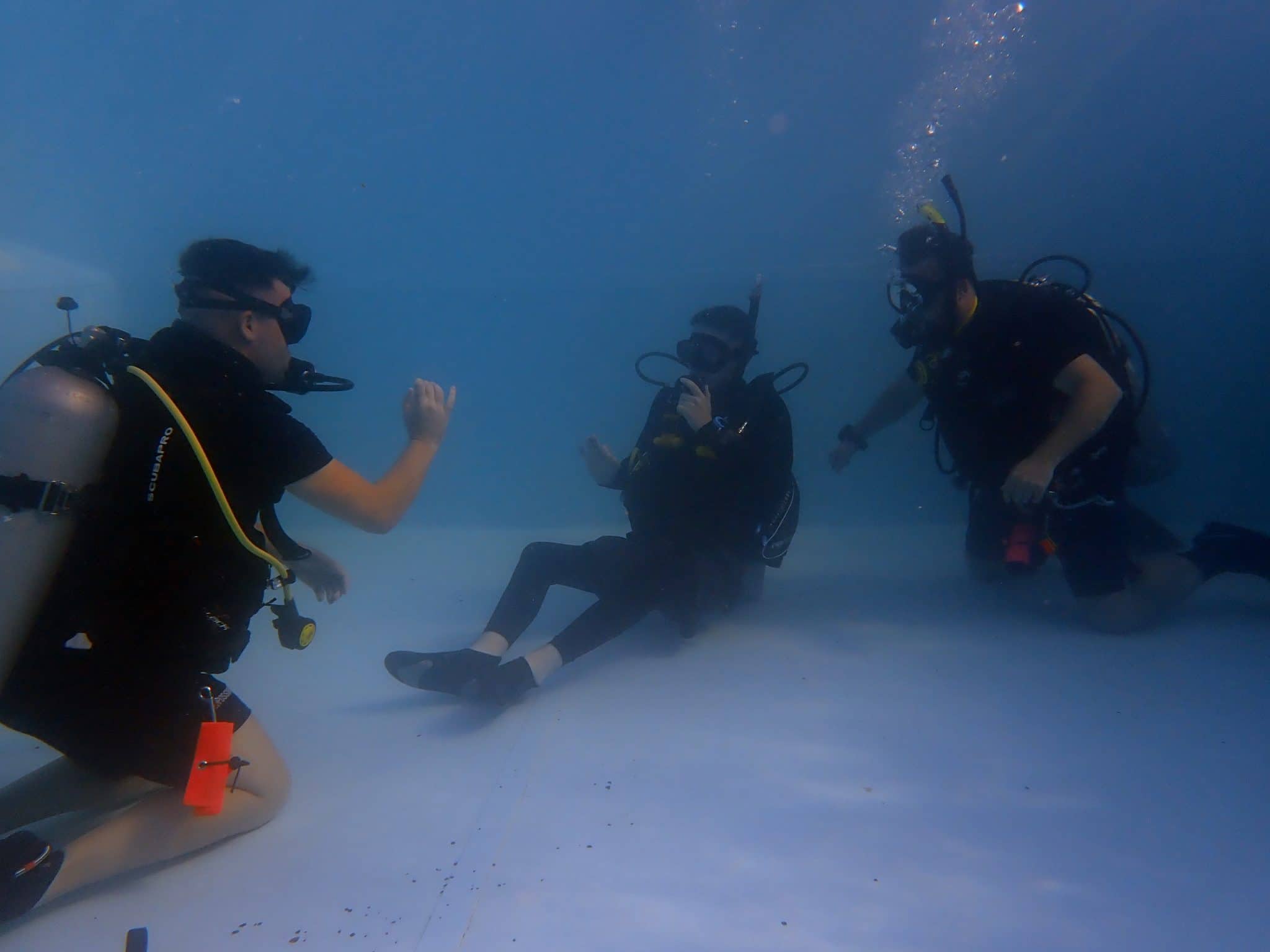
Oatsie asking if Corey is OK during the RAID OW 20 Confined Dives skills
Our intention was to put Corey through his RAID Advanced 35 Course. He had completed all the online learning, and passed the quizzes and exams. Corey is a lovely person; he has a great personality and a determination to succeed in everything he does. As a person, the whole team absolutely loved him.
When kitting up and about to complete a deep-water entry into the pool it became clear that Corey, who is a bright young man, had never carried out some of the skills to the standard required to be an Open Water Diver. We therefore decided to take him through the RAID OW 20 Confined Water dives with our TDMs Oatsie and Michael, who have excellent skill demonstration abilities, running the sessions under my close supervision.
While Oatsie and Michael worked with Corey on Day 1, Swars worked with Keiron whose instructor was Moudi, the Roots General Manager and a very experienced instructor, through the pool dives of the RAID Master Rescue Course.
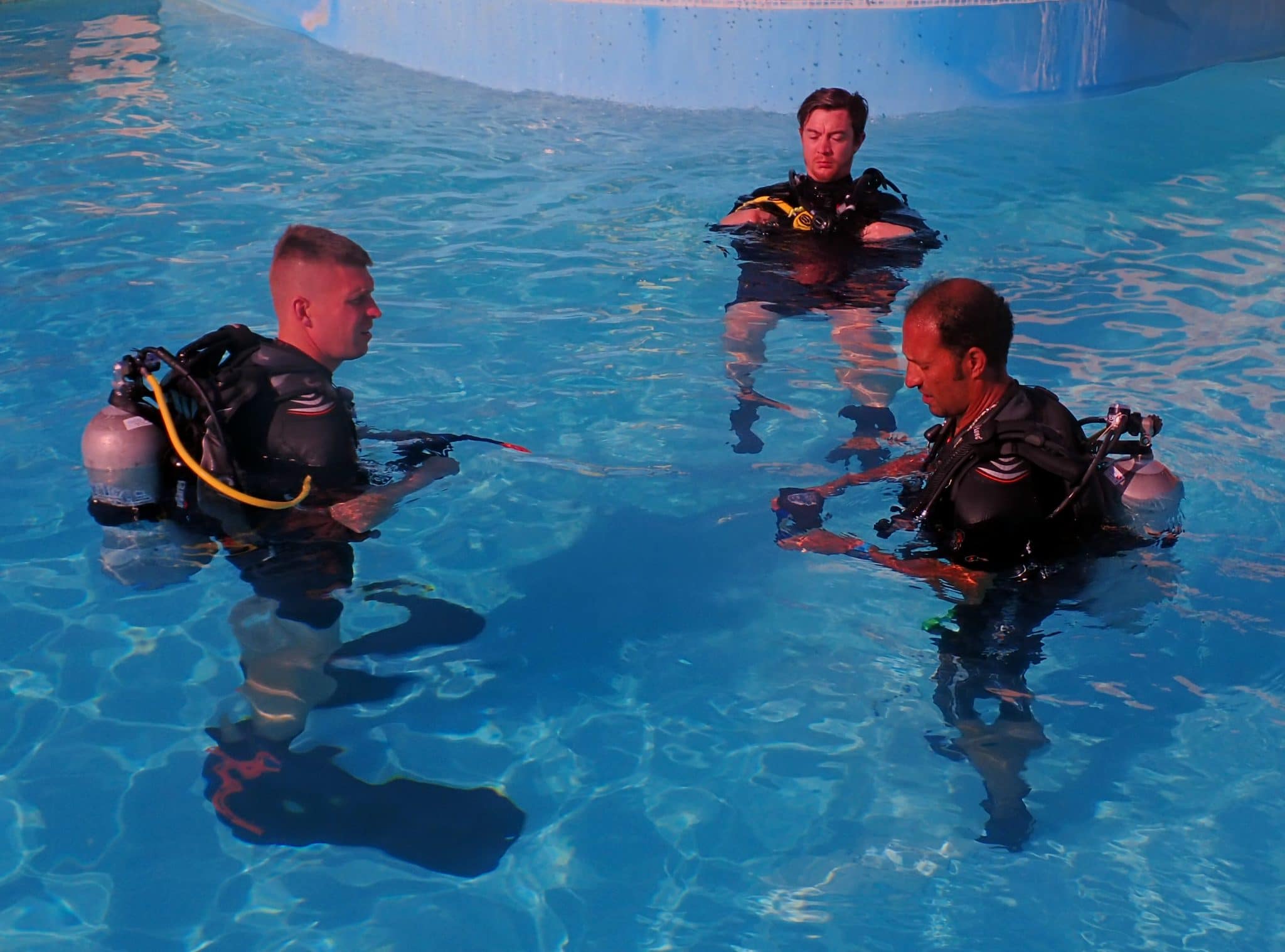
Keiron, trainee divemaster Tom Swarbrick, and instructor Moudi in the pool
For those with physical challenges such as paraplegia or missing limbs, weighting becomes of absolute importance. Paraplegics who have no sensation or movement in their legs swim with a leg down posture. If not balanced with correct weighting they swim underwater in an upright position and not horizontally. Corey assumed this upright position. In Deptherapy we use ‘Bright Weights’ that are attached to the BCD at chest level to help get the student in a horizontal position. Corey had never done a forward descent but had done ‘legs down’ descents and had only dived with support.
Michael and Oatsie did a tremendous job in building up Corey’s skills and confidence. Deptherapy has very high standards when it comes to qualifying divers and we insist on pushing boundaries. Because of the negative stance that many in the diving industry take about divers with disabilities, our expectation is that our students will exceed the required standards.
An Instructor who shows pity or sympathy for a disabled individual and allows them to qualify as divers when they clearly have not met the required standards firstly puts that student at risk, it puts their buddy at risk, and it damages the reputation of all those disabled divers across the world who have met the required standards.
Despite starting from a low base, our determination was by the end of the week to turn Corey into a more than competent RAID Open Water Diver capable of safely being an independent diver, diving with and being able to support a buddy if they required assistance.
Corey, being Corey, accepted the challenge and knew that he had a lot to do. It says a lot about this young man that he faced the challenge square on.
Keiron meanwhile had successfully navigated his way through his confined water dives.
A relaxing and positive evening followed where everyone got to know each other and to talk openly about their challenges and how they dealt with them.
Check back tomorrow as we move to our first day of Open Water training on the magnificent Roots’ House Reefs.
Find out more about the work of Deptherapy and Deptherapy Education at www.deptherapy.co.uk
Blogs
Jeff Goodman Launches Underwater Moviemaker Course with NovoScuba

Transform Your Dive Experiences into Cinematic Masterpieces
NovoScuba has partnered with acclaimed underwater filmmaker Jeff Goodman to introduce the Underwater Moviemaker Course—a revolutionary program designed to equip divers with the skills to capture the breathtaking beauty of the underwater world.
Whether you’re an aspiring filmmaker, an avid diver, or a photography enthusiast, this course offers the tools and expertise needed to create stunning underwater videos. From vibrant coral reefs to curious marine life, you’ll learn how to film, edit, and produce captivating underwater stories, all with expert guidance from a seasoned professional.
Jeff Goodman: A Legacy in Underwater Filmmaking
Jeff Goodman brings over 40 years of experience in underwater film production for television to this course. Reflecting on his career, Jeff said:
“Although technology has dramatically changed, the basics of underwater filming remain constant. This course covers crucial skills for producing great videos. Whether you’re creating professional broadcast films or high-quality hobby videos, the fundamental principles are the same.
A camera operator must master their equipment to capture those magical underwater moments effortlessly. But beyond technical know-how, underwater filmmaking is about having fun and enhancing your diving experiences. So, take your time, learn at your own pace, and enjoy this creative journey.”
About NovoScuba
Founded in 2023, NovoScuba is reshaping dive education with a comprehensive, digitally native platform. Offering cutting-edge training programs for divers at all levels, NovoScuba sets a new benchmark in the diving industry by combining innovation with accessibility.
With ISO-certified courses, a student subscription model, and multilingual support, NovoScuba ensures that dive education is inclusive and engaging. More than just a training provider, NovoScuba fosters a global community of divers committed to exploration, collaboration, and sustainability.
Join the NovoScuba Underwater Moviemaker Course Today!
Dive into the world of underwater filmmaking and start creating cinematic stories that inspire. Learn more about the course and enroll today at www.novoscuba.com/novoscuba-underwater-moviemaker-course.
EXCLUSIVE: Jeff Goodman interviews Mark Spiers, CEO of New Scuba Diving Training Agency NovoScuba
NovoScuba’s Game-Changing Approach for Dive Store Owners: WE PAY YOU!
The diving world thrives on passion and adventure, but for many dive store owners, the financial and operational challenges can be as deep as the ocean.
NovoScuba, an emerging force in the diving world, is on a mission to transform this landscape for the better. With a revolutionary approach to dive store and training agency partnerships, NovoScuba is setting new standards for how dive stores can thrive while keeping their focus on delivering exceptional diving experiences.

A New Paradigm: NovoScuba’s Bold Mission
NovoScuba’s mission is straightforward yet profound: to disrupt the traditional dynamics between dive store owners and training agencies. Traditionally, dive stores have been subjected to substantial fees charged by training agencies, for membership, materials and certifications. These costs have often placed a heavy financial burden on store owners, cutting into their profits and limiting their ability to offer competitive prices to customers.
NovoScuba flips the script by offering a model where dive stores earn money, instead of paying high fees. Dive stores receive commissions for every student they register, and their certification costs are covered. This new model not only boosts profitability but also ensures clients get top-quality training at unbeatable prices.
Financial Upsides: Earn From Student Registration
NovoScuba’s approach is simple yet revolutionary. Dive stores partnering with NovoScuba can earn commissions for every student they enroll.
Here’s how it works: For every student enrolled through NovoScuba, dive stores receive a commission. Each student enrolled will receive their e-learning materials and certification credit included in their subscription. This arrangement is a significant departure from the traditional model, where dive stores often struggle to manage high overhead costs related to training fees and certification expenses.

NovoScuba’s approach ensures that dive stores can focus on what they do best—providing top-notch diving experiences—without being bogged down by excessive financial burdens, and the need to carry large stocks of materials.
Quality Training at a Great Price
NovoScuba stands out by offering high-quality, ISO certified, training that doesn’t break the bank, in fact our students will pay less than with most competing agencies. Clients benefit from top-notch education and safety standards at competitive prices. Dive store owners can confidently promote NovoScuba’s programs, knowing they’re offering fantastic training at affordable rates. This balance of quality and affordability helps dive stores build a strong reputation and attract more customers.
Your Brand is Your Business: NovoScuba’s Commitment to Showcasing Your Identity
At NovoScuba, we understand that your brand is your most valuable asset, and we’re committed to putting it front and centre. Unlike agencies that charge high fees to promote their own brand, we believe in investing in yours. With NovoScuba, you won’t be paying to advertise someone else’s logo alone, — our focus is on showcasing your unique identity. Certifications prominently feature your brand, as well as the training agency, reinforcing your store’s image and brand every step of the way. We’re here to support and elevate your brand, ensuring that your investment directly benefits your business.
Affordable Membership: An Investment in Your Success
NovoScuba’s membership model is designed with dive store owners in mind. Membership fees are kept low and include annual Pro member fees for your team. Payment can be made monthly or annually in your local currency, avoiding the hassle of exchange rate fluctuations. NovoScuba promises no exchange rate changes without a six-month notice, ensuring financial stability and simplifying budgeting. With a membership lasting 12 months from date of joining, you’ll enjoy a full year of NovoScuba’s benefits and support.

Streamlined Operations: Simplifying Your Workload
Handling administrative tasks can be a challenge, but NovoScuba makes it easier. We’ve streamlined certification procedures and reduced paperwork to help dive stores operate more efficiently. Certification processing is quick and straightforward, allowing more focus on teaching and customer service. Our system minimises bureaucracy by storing necessary forms in student profiles, reducing paperwork and administrative delays.
Crossover Made Easy
For dive stores looking to transition to NovoScuba’s model, the crossover process is designed to be smooth and hassle-free. NovoScuba provides support to ensure that the transition is as seamless as possible, helping dive store owners integrate into the new system with minimal disruption. Experienced dive Pros don’t need to undergo extensive retraining. Our crossover is designed to familiarise Pros with NovoScuba’s user-friendly platform, standards and course structures, and not to waste time and expense re-training in water.
With just a few simple steps, you’ll be ready to offer top-notch training through NovoScuba.
Comprehensive Business Support and Training Included in Your Membership
NovoScuba goes beyond financial benefits by offering experienced support and training. This value added service includes:
- Business Training: Optimise your operations with guidance on marketing, customer service, and best practices.
- Marketing and Promotion: Access resources to attract new customers and boost your store’s visibility. Enjoy cross promotions with NovoScuba to gain increased exposure.
- Ongoing Support: NovoScuba’s commitment to its partners extends beyond initial training and setup. The company offers ongoing support to address any issues or questions that arise. This continuous support ensures that dive store owners have a reliable resource to turn to whenever they need assistance.

Embracing Digital Natives: Instant Evolution and Continuous Improvement
NovoScuba’s digital-native approach is a game-changer. Leveraging cutting-edge technology, we ensure our services evolve and improve swiftly. Dive stores benefit from instant updates, the latest features, enhancements, and effective solutions, keeping them ahead of the curve. This continuous improvement helps dive stores stay competitive and deliver exceptional services. Whether it’s a new course update, additional marketing resources, or improved e-learning functions, NovoScuba’s digital infrastructure ensures that dive stores are always equipped with the most current and effective solutions. This continuous evolution not only helps dive stores stay ahead in a competitive market but also ensures they consistently provide top-quality services to their clients.
Why Is NovoScuba Doing This? – Fair Profit Sharing for Greater Access and Growth
At NovoScuba, we’ve taken a bold step by paying commissions to stores rather than following the traditional model of training agencies charging high fees. Our mission is to make diving accessible to everyone and to foster a growing community of new divers and continued education. By redistributing profits more equitably between stores and training agencies, we aim to create a more supportive and collaborative environment within the industry. We believe this approach not only helps individual stores thrive but also stimulates overall growth and innovation in diving. Our commitment to fair profit sharing reflects our dedication to the long-term health and expansion of the diving community.

Everyone is getting a piece of the pie.
Getting Started: Join the NovoScuba Revolution
Ready to revolutionise your dive store experience? NovoScuba is here to support your journey toward reduced costs, increased profitability, and enhanced operational efficiency. Get in touch with our team to learn how NovoScuba can transform your business.
For more information, email info@novoscuba.com or visit www.novoscuba.academy.
Blogs
NovoScuba’s Game-Changing Approach for Dive Store Owners: WE PAY YOU!

 The diving world thrives on passion and adventure, but for many dive store owners, the financial and operational challenges can be as deep as the ocean.
The diving world thrives on passion and adventure, but for many dive store owners, the financial and operational challenges can be as deep as the ocean.
NovoScuba, an emerging force in the diving world, is on a mission to transform this landscape for the better. With a revolutionary approach to dive store and training agency partnerships, NovoScuba is setting new standards for how dive stores can thrive while keeping their focus on delivering exceptional diving experiences.

A New Paradigm: NovoScuba’s Bold Mission
NovoScuba’s mission is straightforward yet profound: to disrupt the traditional dynamics between dive store owners and training agencies. Traditionally, dive stores have been subjected to substantial fees charged by training agencies, for membership, materials and certifications. These costs have often placed a heavy financial burden on store owners, cutting into their profits and limiting their ability to offer competitive prices to customers.
NovoScuba flips the script by offering a model where dive stores earn money, instead of paying high fees. Dive stores receive commissions for every student they register, and their certification costs are covered. This new model not only boosts profitability but also ensures clients get top-quality training at unbeatable prices.
Financial Upsides: Earn From Student Registration
NovoScuba’s approach is simple yet revolutionary. Dive stores partnering with NovoScuba can earn commissions for every student they enroll.
Here’s how it works: For every student enrolled through NovoScuba, dive stores receive a commission. Each student enrolled will receive their e-learning materials and certification credit included in their subscription. This arrangement is a significant departure from the traditional model, where dive stores often struggle to manage high overhead costs related to training fees and certification expenses.

NovoScuba’s approach ensures that dive stores can focus on what they do best—providing top-notch diving experiences—without being bogged down by excessive financial burdens, and the need to carry large stocks of materials.
Quality Training at a Great Price
NovoScuba stands out by offering high-quality, ISO certified, training that doesn’t break the bank, in fact our students will pay less than with most competing agencies. Clients benefit from top-notch education and safety standards at competitive prices. Dive store owners can confidently promote NovoScuba’s programs, knowing they’re offering fantastic training at affordable rates. This balance of quality and affordability helps dive stores build a strong reputation and attract more customers.
Your Brand is Your Business: NovoScuba’s Commitment to Showcasing Your Identity
At NovoScuba, we understand that your brand is your most valuable asset, and we’re committed to putting it front and centre. Unlike agencies that charge high fees to promote their own brand, we believe in investing in yours. With NovoScuba, you won’t be paying to advertise someone else’s logo alone, — our focus is on showcasing your unique identity. Certifications prominently feature your brand, as well as the training agency, reinforcing your store’s image and brand every step of the way. We’re here to support and elevate your brand, ensuring that your investment directly benefits your business.
Affordable Membership: An Investment in Your Success
NovoScuba’s membership model is designed with dive store owners in mind. Membership fees are kept low and include annual Pro member fees for your team. Payment can be made monthly or annually in your local currency, avoiding the hassle of exchange rate fluctuations. NovoScuba promises no exchange rate changes without a six-month notice, ensuring financial stability and simplifying budgeting. With a membership lasting 12 months from date of joining, you’ll enjoy a full year of NovoScuba’s benefits and support.

Streamlined Operations: Simplifying Your Workload
Handling administrative tasks can be a challenge, but NovoScuba makes it easier. We’ve streamlined certification procedures and reduced paperwork to help dive stores operate more efficiently. Certification processing is quick and straightforward, allowing more focus on teaching and customer service. Our system minimises bureaucracy by storing necessary forms in student profiles, reducing paperwork and administrative delays.
Crossover Made Easy
For dive stores looking to transition to NovoScuba’s model, the crossover process is designed to be smooth and hassle-free. NovoScuba provides support to ensure that the transition is as seamless as possible, helping dive store owners integrate into the new system with minimal disruption. Experienced dive Pros don’t need to undergo extensive retraining. Our crossover is designed to familiarise Pros with NovoScuba’s user-friendly platform, standards and course structures, and not to waste time and expense re-training in water.
With just a few simple steps, you’ll be ready to offer top-notch training through NovoScuba.
Comprehensive Business Support and Training Included in Your Membership
NovoScuba goes beyond financial benefits by offering experienced support and training. This value added service includes:
- Business Training: Optimise your operations with guidance on marketing, customer service, and best practices.
- Marketing and Promotion: Access resources to attract new customers and boost your store’s visibility. Enjoy cross promotions with NovoScuba to gain increased exposure.
- Ongoing Support: NovoScuba’s commitment to its partners extends beyond initial training and setup. The company offers ongoing support to address any issues or questions that arise. This continuous support ensures that dive store owners have a reliable resource to turn to whenever they need assistance.
Embracing Digital Natives: Instant Evolution and Continuous Improvement
NovoScuba’s digital-native approach is a game-changer. Leveraging cutting-edge technology, we ensure our services evolve and improve swiftly. Dive stores benefit from instant updates, the latest features, enhancements, and effective solutions, keeping them ahead of the curve. This continuous improvement helps dive stores stay competitive and deliver exceptional services. Whether it’s a new course update, additional marketing resources, or improved e-learning functions, NovoScuba’s digital infrastructure ensures that dive stores are always equipped with the most current and effective solutions. This continuous evolution not only helps dive stores stay ahead in a competitive market but also ensures they consistently provide top-quality services to their clients.
Why Is NovoScuba Doing This? – Fair Profit Sharing for Greater Access and Growth
At NovoScuba, we’ve taken a bold step by paying commissions to stores rather than following the traditional model of training agencies charging high fees. Our mission is to make diving accessible to everyone and to foster a growing community of new divers and continued education. By redistributing profits more equitably between stores and training agencies, we aim to create a more supportive and collaborative environment within the industry. We believe this approach not only helps individual stores thrive but also stimulates overall growth and innovation in diving. Our commitment to fair profit sharing reflects our dedication to the long-term health and expansion of the diving community.

Everyone is getting a piece of the pie.
Getting Started: Join the NovoScuba Revolution
Ready to revolutionise your dive store experience? NovoScuba is here to support your journey toward reduced costs, increased profitability, and enhanced operational efficiency. Get in touch with our team to learn how NovoScuba can transform your business.
For more information, email info@novoscuba.com or visit www.novoscuba.academy.
-

 News2 months ago
News2 months agoIconic SS United States to become the World’s Largest Artificial Reef
-

 News3 months ago
News3 months agoBook Review – 52 Assignments: Underwater Photography
-

 Gear News3 months ago
Gear News3 months agoDYNAMICNORD – New German diving brand enters the British market
-

 News3 months ago
News3 months agoExploring Cenote El Pit: A Diver’s Dream
-

 Gear News3 months ago
Gear News3 months agoTry BARE drysuits (and maybe even win one!) this Friday with Sea & Sea at North West Dive Fest
-

 Marine Life & Conservation3 months ago
Marine Life & Conservation3 months agoBook Review: Coral Triangle Cameos
-

 Blogs2 months ago
Blogs2 months agoDive the Egyptian Red Sea this Autumn with Regaldive
-

 News3 months ago
News3 months ago2024 Ocean Art Underwater Photo Competition Announced
















